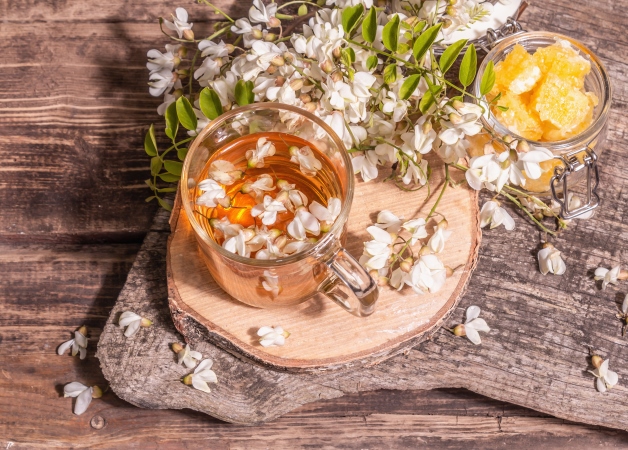Acacia tea, derived from the leaves, flowers, or bark of the Acacia tree (genus Acacia), is a lesser-known herbal infusion with a rich history in traditional medicine. Prized for its soothing and healing properties, this tea offers a unique blend of wellness benefits.
Whether you’re seeking digestive relief, immune support, or a calming beverage, Acacia tea may be a valuable addition to your herbal tea collection.
What is Acacia Tea?
Acacia tea is made from parts of the Acacia tree, a plant found in tropical and subtropical regions worldwide. Different species—such as Acacia arabica (Babul) and Acacia nilotica—are used in herbal remedies. The tea has a mild, slightly woody flavor, sometimes with floral or earthy notes, depending on the plant part used.
Key Health Benefits of Acacia Tea
1. Supports Digestive Health
✔️ Relieves diarrhea & stomach ulcers – Contains tannins with astringent properties.
✔️ Reduces bloating & indigestion – Acts as a natural carminative.
✔️ May help with constipation – Some species have mild laxative effects.
2. Boosts Immunity & Fights Infections
✔️ Antibacterial & antiviral properties – Helps combat pathogens.
✔️ Rich in antioxidants – Protects cells from oxidative damage.
3. Anti-Inflammatory & Pain Relief
✔️ Soothes sore throat & mouth ulcers (often used as a gargle).
✔️ May ease joint pain & arthritis due to anti-inflammatory compounds.
4. Promotes Oral Health
✔️ Traditionally used to strengthen gums and reduce plaque.
✔️ Helps with gingivitis & bad breath due to antimicrobial effects.
5. May Aid in Diabetes Management
✔️ Some studies suggest Acacia helps regulate blood sugar levels.
✔️ Contains fiber that slows glucose absorption.
6. Skin Healing Properties
✔️ Used topically for wounds, burns, and eczema.
✔️ Antioxidants promote faster skin repair.
How to Prepare Acacia Tea
Ingredients:
- 1 tsp dried Acacia leaves, flowers, or bark (or 1 tea bag)
- 1 cup hot water (not boiling, ~90°C)
- Optional: honey, lemon, or cinnamon for flavor
Instructions:
- Steep Acacia in hot water for 5-7 minutes.
- Strain (especially if using bark to avoid grittiness).
- Drink warm, up to 2 cups per day.
💡 Tip: For a stronger medicinal effect, simmer bark for 10-15 minutes as a decoction.
Contraindications & Side Effects
While generally safe, Acacia tea should be used with caution:
⚠️ Pregnancy & Breastfeeding – Limited research; consult a doctor.
⚠️ Allergies – Those allergic to pollen or acacia gum (used in food) should avoid it.
⚠️ Medication Interactions – May affect diabetes or blood pressure drugs.
⚠️ Overconsumption – High tannin content may cause nausea or constipation.

Acacia tea is a versatile herbal remedy with benefits ranging from digestive relief to immune support. Whether enjoyed as a daily tonic or used medicinally, it’s a fascinating addition to natural wellness practices.
Have you tried Acacia tea?
Share your experience in the comments! 🌿☕
Interested in more herbal tea guides? Let me know what to explore next!

